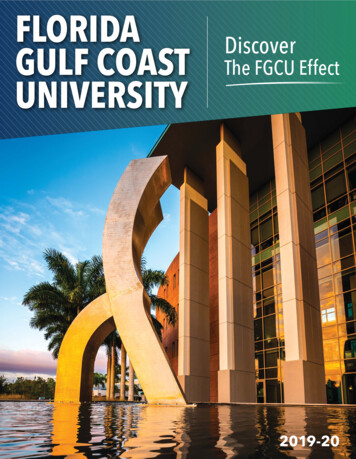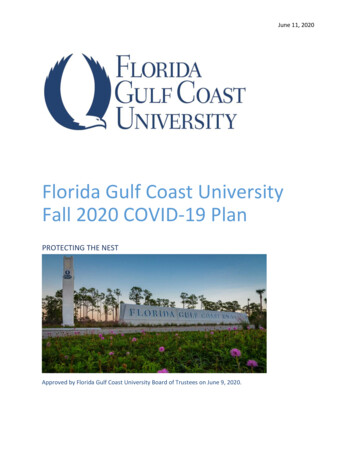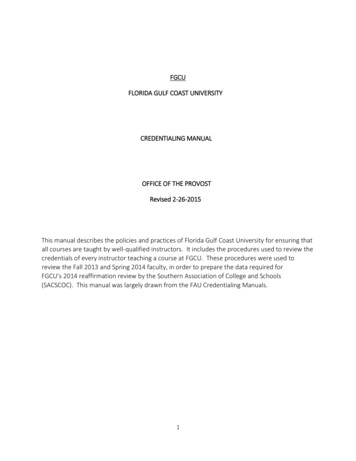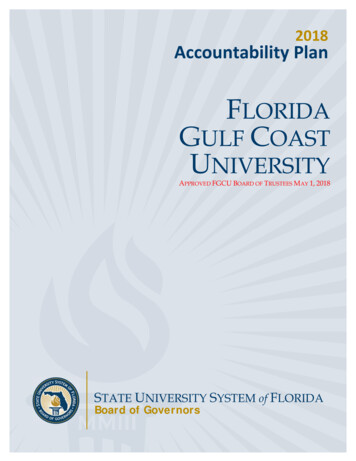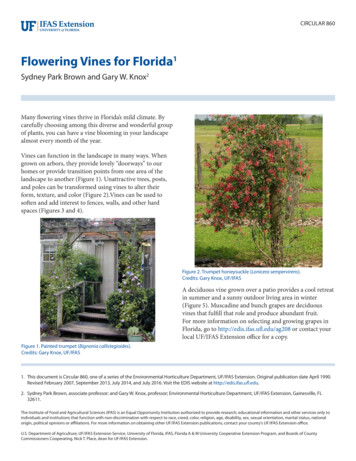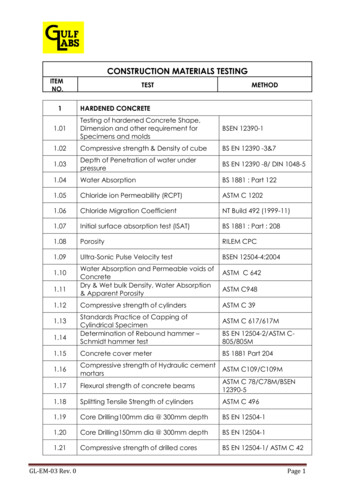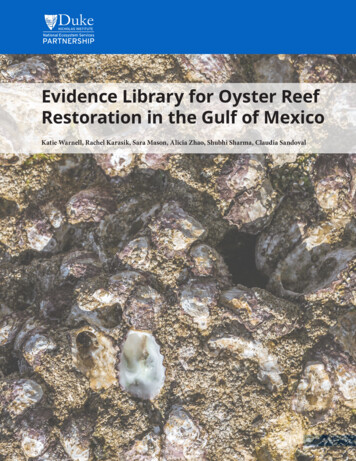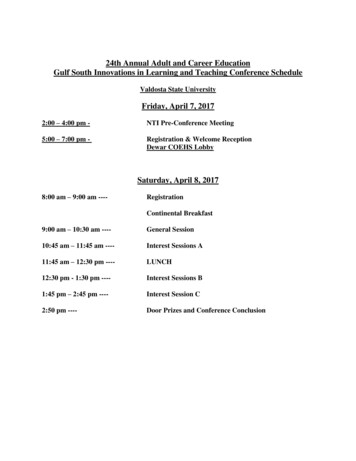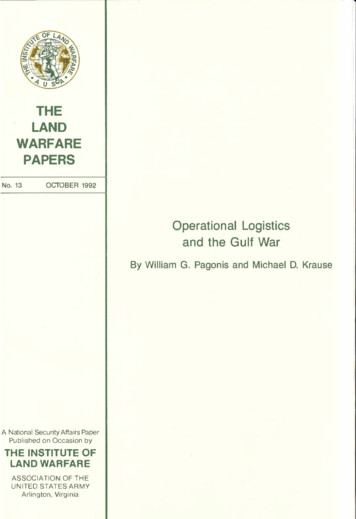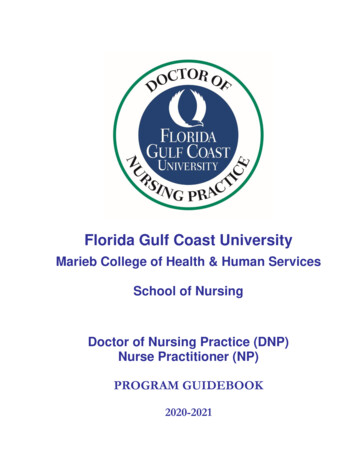
Transcription
Florida Gulf Coast UniversityMarieb College of Health & Human ServicesSchool of NursingDoctor of Nursing Practice (DNP)Nurse Practitioner (NP)PROGRAM GUIDEBOOK2020-2021
DNP PROGRAM GUIDEBOOK 2020-20212FOREWORDProgram Director’s Welcome to StudentsWelcome to the School of Nursing at Florida Gulf Coast University (FGCU). We are pleased that yourchoice for graduate education is at FGCU School of Nursing. Faculty has designed rigorous curricula atthe graduate level with innovative classroom, clinical and community experiences to prepare students topromote the health of our population in the 21st century. The Doctor of Nursing Practice NursePractitioner (DNP NP) Program builds on the excellent reputation of our MSN graduates who aremaking a difference in their communities. To date, we have had a 100% first-time board certificationpass rate.The School of Nursing DNP NP Program Guidebook 2020-2021 is designed to facilitate yourorientation to the School of Nursing and DNP NP Program and to assist you in your progress towardachieving a DNP degree. Please take time to review the Guidebook and become familiar with theacademic standards, policies and procedures that will guide your educational experience. We encourageeach of you to participate fully in our commitment to graduate nursing education and the profession ofnursing.This guidebook should be used as a supplement to the current FGCU University Academic Catalog,FGCU Graduate Student Handbook, FGCU General Graduate Academic Policies, and Student Code ofConduct and other University, Marieb College of Health and Human Services, School of Nursing, andNurse Practitioner Program Publications. As such, the policies, procedures, regulations, requirements,standard of conduct and other information are not reprinted herein, but incorporated by reference hereinas if all the foregoing were set forth at length. Additional resources are provided on the DNP portalaccessed via Canvas, the FGCU learning management system.Please be aware that the University and the School of Nursing reserve the right and authority at any timeto alter any of the statements contained herein, to modify curriculum, policies, guidelines, forms, andany other information contained in this School of Nursing DNP NP Program Guidebook. The provisionsof this publication are subject to change without notice or obligation during your tenure in the program.Again, welcome to the DNP NP Program at Florida Gulf Coast University School of Nursing. We lookforward to collaborating with you throughout your journey as a doctoral student in the DNP NursePractitioner Program. Welcome to the Eagles family!Loureen Downes Ph.D., APRN, FNP-BC, FAANPAssociate ProfessorDoctor of Nursing Practice Nurse Practitioner Program DirectorDNP NP AY 2020-2021 July 9, 2020 –ADA Compliant
DNP PROGRAM GUIDEBOOK 2020-2021AccreditationInformation on FGCU institutional accreditation is availableat http://www.fgcu.edu/Provost/accreditation.htmlThe Doctor of Nursing Practice program in nursing at Florida Gulf CoastUniversity is accredited by the Commission on Collegiate Nursing Education.(http://www.ccneaccreditation.org)DNP NP AY 2020-2021 July 9, 2020 –ADA Compliant3
DNP PROGRAM GUIDEBOOK 2020-2021School of Nursing Faculty and StaffNAMENOLAN, AnneTITLEPHONE BUILDING/ROOM:WARN, GretchenDirector, School of Nursing590-7513Associate ProfessorElizabeth A. and Jack A. Conner Professor inNursingProgram Director Doctor of Nursing Practice 590-7449Associate ProfessorAdministrative Specialist, Graduate Programs 590-7505Casey, ImkeAssistant ProfessorDOWNES, LoureenMarieb 307Marieb 309Marieb 303CDAVIS-HUFFMAN, Paula Assistant Professor590-7514Marieb 339DZIOBA, ChristinaAssistant Professor745-4586Marieb 306ELLIS, Tina A.Instructor I590-7507Marieb 306GOEBEL, KellyProgram Director, BSNAssistant Professor590-7431Marieb 442HAHN, ValerieInstructor I590-7523Marieb 420HARNER, AnneAssistant Professor590-1358Marieb 337HOBART, KimAdministrative Assistant SON590-7454Marieb 303AHOOKER, LynnAdministrative Specialist BSN590-7485Marieb 303BINGRAM, KatherineInstructor I745-4465Marieb 445LONDAHL-RAMSEY,VirginiaLYNN, MelissaAssistant Professor745-4473Marieb 325Instructor II590-7520Marieb 443MAHMOUND, JihanAssistant Professor745-4582Marieb 431MARTINEZ, MirianeNursing Coordinator590-1169Marieb 304MELHADO, LolitaAssistant Professor590-7457Marieb 441MURRAY, ElizabethProgram Director MSN Nurse EducatorAssociate ProfessorNursing Laboratory Assistant590-7510Marieb 322590-7519Marieb 323PORTNOY, LynneAssistant Program Director NurseAnesthesiologyAssistant ProfessorVisiting Instructor I745-4537RONCO, SabrinaInstructor I590-7521Marieb Hall211BMarieb 446SADIGHI, TammyAssistant Professor745-4309Marieb 330SPIEGEL, Rosann745-4298Marieb 313SWAYNE, CherylProgram Director, Nurse AnesthesiologyAssistant ProfessorAssistant Professor754-4397Marieb 316WRIGHT, SharonInstructor/Lecturer745-4474Marieb 427NEWMAN, JenniferNEWMAN, JohannaDNP NP AY 2020-2021 July 9, 2020 –ADA Compliant590-75184
DNP PROGRAM GUIDEBOOK 2020-2021DNPNP PROGRAM GUIDEBOOK2020-2021CONTENTSForeword, Program Director’s Welcome .2Accreditation .3Faculty and Staff 4I.Introduction to DNP NP Program 8School of Nursing Vision, Mission, and Philosophy . . .8DNP Program Overview .9DNP Program Student Learning Outcomes .10Nurse Practitioner Core Competencies (NONPF) 10DNP Nurse Practitioner (NP) Major Curriculum .12DNP NP Program Requirements . 13DNP Program Course Descriptions and Credit Hours .14DNP NP Program Policies and Guidelines . .16Admission Requirements . 16Advising .18Academic Behavior Standards and Academic Integrity .19DNP Program Plan of Study Policy .19Academic Progression Standards .20Core Performance Standards 21Appeal Process .22Attendance and Punctuality .23School of Nursing Civility Policy 24Computer/Technological Device Requirements .24Deferral Policy .27Disciplinary and Remediation Actions .27II.DNP NP AY 2020-2021 July 9, 2020 –ADA Compliant5
DNP PROGRAM GUIDEBOOK 2020-2021Email Policy .28Faculty Evaluation of Students .28Grading System .29Graduation Requirements .29Grievances/Program Complaints .30Chemical Impairment Policy and Procedure .30Information Sharing Policy 36School of Nursing Leave of Absence Policy and Procedure .36Typhon .36DNP NP Student Workload Policy .37III. Clinical Practice and Laboratory Policies and Guidelines .37American Heart Association BLS 37Background Checks .38Cell Phone Policy .38Social Media Policy .38Clinical Documentation 41Clinical Incidents .41Clinical Site Rotations .41Florida RN License & Current Registration .43Health Insurance 43Human Immunodeficiency Virus Policy 43Immunization and Screening Tests 45Professional Attire & Name Tags Requirement 46Equipment & Supplies . 46Professional Liability Insurance 47Travel Requirement 47Unsafe/Unprofessional Behavior Policy and Procedure 47IV. General Information . .52Canvas .52DNP NP AY 2020-2021 July 9, 2020 –ADA Compliant6
DNP PROGRAM GUIDEBOOK 2020-2021V.College Forms . .52Confidentiality and Privacy Rights .52Intellectual Property Policy .52Copying of Student Records .52Disability Accommodations Services . 53Graduate Tuition Waivers 53Library Holdings .53Name and Address Change .53Student Observance of Religious Holidays .54Student Representation on School of Nursing Committees .54Tau Zeta Chapter, Sigma Theta Tau International Honor Society . 54Disclaimer & Reservation of Rights 55APPENDICES . 56Appendix A- DNP Program Student Guidebook Receipt Acknowledgement 57Appendix B- SON DNP Program Leave of Absence Request Form 58Appendix C- DNP Program Plans (BSN to DNP and MSN to DNP) . 59Appendix D- Progression Plans . 61Appendix E- DNP Independent Study in Nursing Proposal .66Appendix F- Confidentiality Agreement .68Appendix G - School of Nursing Student Performance Improvement Plan69Appendix H- DNP Verification of Precepted MSN Clinical Hours .71Appendix I- Intellectual Property Policy .72Appendix J- Academic Progression Standards Waiver due to COVID-1973DNP NP AY 2020-2021 July 9, 2020 –ADA Compliant7
DNP PROGRAM GUIDEBOOK 2020-2021I.8INTRODUCTION TO DNP NURSE PRACTITIONER PROGRAMSCHOOL OF NURSING VISION, MISSION, AND PHILOSOPHY Adopted: April 2008; RevisedMarch 2017VisionThe School of Nursing envisions a future where faculty and students serve as mentors andinterprofessional role models to develop engaged nurse leaders who deliver transformative care todiverse populations, conduct research, and promote evidence-based practice through academic andcommunity partnerships.Our ValuesCaring Value and exhibit a personal commitment of concern and empathy for patients,families, communities and self without bias Jean Watson: A caring environment is one that offers the development of potentialwhile allowing the patient to choose the best action for him or herself at a given pointin timeHealth Promotion Actively participate in a culture acknowledging wellness, prevention, wholeness,physical and mental health, incorporating the mind, body and spirit of patients,families, communities and self Hochbaum, Rosenstock & Kegels’ Health Belief Model: A person’s health- relatedbehavior depends on the person’s perception of severity of a potential illness,susceptibility to the illness, benefits of taking preventive action, barriers to taking thataction, and self-efficacyCritical Thinking Mindful, judicious use of available knowledge and information to produce bestoutcomes for patients, families and communities Patricia Benner: Expert nurses develop skills and understanding of patient care overtime through a sound educational base and a multitude of experiencesCultural Connectedness Embrace diversity and uniqueness of patients, families, and communities whilerecognizing the importance of self-awareness Madeleine Leininger: Culture refers to learned, shared, and transmitted values,beliefs, norms and lifeways to a specific individual or group that guide theirthinking, decisions, actions and pattered ways of livingCommunication Commitment to respectful interpersonal and interprofessional conveyance oftrustworthy, responsible, reliable and ethical information Hildegard Peplau: The six main roles of a nurse are stranger, teacher, resourceperson, counselor, surrogate and leaderDNP NP AY 2020-2021 July 9, 2020 –ADA Compliant
DNP PROGRAM GUIDEBOOK 2020-20219Safety Culture The focus is on effective teamwork to accomplish the goal of safe, high- quality health care. QSEN Institute: A patient safety culture incorporates safety principles and is nonpunitive andemphasizes accountability, excellence, honesty, integrity, and mutual respect.MissionThe School of Nursing mission is consistent with the mission and goals of Florida Gulf Coast Universityand the Marieb College of Health & Human Services.The School of Nursing strives for excellence in providing evidence-based, learner-centered nursingeducation that prepares competent and compassionate nursing professionals to meet the ever-changinghealthcare needs of diverse global communities.PhilosophyThe faculty of the School of Nursing believes that the practice of professional nursing rests upon asound arts and science foundation that prepares graduates to excel in a diverse, rapidly changing, andtechnologically oriented society. Faculty members serve as guides, mentors, role models, andfacilitators for students to synthesize the roles and responsibilities of the scope of nursing practice.Integrated and conceptually based curricula are built upon the principles of communication, criticalthinking, cultural-connectedness, health promotion, and adherence to professional and ethical standardsof practice, which form the foundation for knowledge and skills essential for nursing professionals.Teaching and learning activities are keystones of the curricula and occur within caring, interdisciplinary,and environmentally sensitive settings.Nurse Practitioner Program PhilosophyThe Nurse Practitioner Faculty believes that graduate nursing education builds upon the foundation ofundergraduate nursing education, and that application of communication, critical thinking, culturalconnectedness, health promotion, and adherence to professional and ethical standards of practice withina rapidly changing, diverse and technologically oriented society are essential aspects of nursepractitioner practice. The Nurse Practitioner Program embraces patient-centered holistic care that issafe, competent, current and culturally sensitive. The Nurse Practitioner Faculty are committed to lifelong learning, professional development, academic excellence, scholarly inquiry, collegiality,collaboration and cohesiveness.DNP PROGRAM OVERVIEWThe Doctor of Nursing Practice Program prepares advanced practice nurses for leadership clinicalopportunities in a variety of evolving global health care environments. The ability to create innovativeroles as well as consolidate existing roles is a hallmark of graduates. Extensive practice experiencesenable student-initiated opportunities that promote development of diverse knowledge, values, andcompetencies essential for advanced practice. Throughout the DNP Program, students are guided in theprocesses of self-development aimed at pursuing excellence in scholarly and professional endeavors.The FGCU BSN to DNP Program offers specialty practice studies leading to eligibility as a certifiedFamily Nurse Practitioner (FNP). The BSN to DNP studies also include the DNP core that focuses onutilization of research in the practice setting, quality of care delivery, examination of health careDNP NP AY 2020-2021 July 9, 2020 –ADA Compliant
DNP PROGRAM GUIDEBOOK 2020-202110outcomes, leadership in practice, and fundamentals of nurse education. The total credit hours requiredfor the Nurse Practitioner BSN to DNP major is 81 and a minimum of 1000 practice hours. The programcan be completed in eight semesters (three years) of full-time study or 11 semesters of part-time (fouryears) study.A MSN to DNP is available to candidates who have already completed a Master’s degree in nursingfrom a nationally accredited nursing program with a clinical specialty practice area. The MSN to DNPbuilds upon the candidate’s specialty practice area through a DNP core that focuses on utilization ofresearch in the practice setting, quality of care delivery, examination of health care outcomes, leadershipin practice, and fundamentals of nurse education. The total credit hours required for the MSN to DNP is36 credit hours and a minimum of 1000 hours including MSN clinical practice hours.DNP PROGRAM STUDENT LEARNING OUTCOMES (DNP Essential #)At the completion of the program, graduates will:1. Collaborate with other healthcare professionals to provide high quality, ethical patientcentered care that meets current standards of best practice. (# 2)2. Lead inter-professional teams to design, implement, and evaluate clinical practice strategiesbased on theoretical, scientific, and ethical knowledge. (#1, #2, #6)3. Integrate advanced critical reasoning and judgment in the management of complexclinical situations and systems in a selected area of advanced practice nursing andorganizational systems. (#8)4. Implement health care delivery models and strategies designed for increased safety andquality improvement in health promotion, clinical prevention and population health. (#2, #7)5. Employ evidence-based framework and information technology to evaluate and developstrategies and interventions to improve health status, access patterns, and identify gaps incare of diverse patients, populations, and organizations. (#1, #3, #4)6. Advocate for change in health care practice and health care environments through policydevelopment, implementation, and evaluation. (#2, #5, #8)NURSE PRACTITIONER CORE COMPETENCIES(From the National Organization of Nurse Practitioner Faculties, 2017)Scientific Foundation Competencies1. Critically analyzes data and evidence for improving advanced nursing practice.2. Integrates knowledge from the humanities and sciences within the context of nursing science.3. Translates research and other forms of knowledge to improve practice processes and outcomes.4. Develops new practice approaches based on the integration of research, theory, and practice knowledge.Leadership Competencies1. Assumes complex and advanced leadership roles to initiate and guide change.2. Provides leadership to foster collaboration with multiple stakeholders (e.g. patients, community,integrated health care teams, and policy makers) to improve health care.3. Demonstrates leadership that uses critical and reflective thinking.4. Advocates for improved access, quality and cost effective health care.5. Advances practice through the development and implementation of innovations incorporating principlesof change.DNP NP AY 2020-2021 July 9, 2020 –ADA Compliant
DNP PROGRAM GUIDEBOOK 2020-2021116. Communicates practice knowledge effectively both orally and in writing.7. Participates in professional organizations and activities that influence advanced practice nursing and/orhealth outcomes of a population focus.Quality Competencies1. Uses best available evidence to continuously improve quality of clinical practice.2. Evaluates the relationships among access, cost, quality, and safety and their influence on health care.3. Evaluates how organizational structure, care processes, financing, marketing and policy decisions impactthe quality of health care.4. Applies skills in peer review to promote a culture of excellence.5. Anticipates variations in practice and is proactive in implementing interventions to ensure quality.Practice Inquiry Competencies1. Provides leadership in the translation of new knowledge into practice.2. Generates knowledge from clinical practice to improve practice and patient outcomes.3. Applies clinical investigative skills to improve health outcomes.4. Leads practice inquiry, individually or in partnership with others.5. Disseminates evidence from inquiry to diverse audiences using multiple modalities.6. Analyzes clinical guidelines for individualized application into practiceTechnology and Information Literacy Competencies1. Integrates appropriate technologies for knowledge management to improve health care.2. Translates technical and scientific health information appropriate for various users’ needs.a. Assesses the patient’s and caregiver’s educational needs to provide effective, personalizedhealth care.b. Coaches the patient and caregiver for positive behavioral change.3. Demonstrates information literacy skills in complex decision making.4. Contributes to the design of clinical information systems that promote safe, quality and costeffective care.5. Uses technology systems that capture data on variables for the evaluation of nursing care.Policy Competencies1. Demonstrates an understanding of the interdependence of policy and practice.2. Advocates for ethical policies that promote access,
DNP PROGRAM GUIDEBOOK 2020-2021 DNP NP AY 2020-2021 July 9, 2020 –ADA Compliant 2 FOREWORD Program Director’s Welcome to Students Welcome to the School of Nursing at Florid


